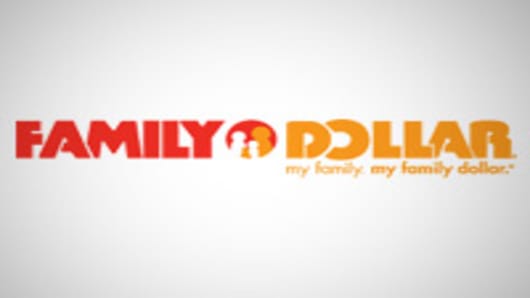Family Dollarearnings beat the Street on Wednesday, prompting analysts to weigh in.
Trouble is, they don’t at all agree.
Here’s the bullish argument:“The industry is very well positioned right now, and they did an extraordinary job of managing expenses last quarter,” said Meredith Adler, managing director for Barclays.
The numbers support her argument, at least in part. Second-quarter earnings rose 11 percent on increased customer traffic, and same-store sales rose 4.5 percent.
Adler has an “overweight” rating and a $63 price target on the stock, which hovered under $59 in midafternoon trading.
“I see this company moving into a new phase. They’ve now got some new management, who I believe will help them improve the consistency of performance at the stores, which has probably been their weakest area,” added Adler.
She has high expectations, in particular, for Family Dollar’s new chief operating officer, Michael Bloom, who was previously with CVS Caremark.
On the other hand, Piper Jaffray analyst Peter Keith cites plenty of bearish factors.
“With 4.5 percent same-store sales, they actually missed their 5 percent guidance. That marks the fifth-straight quarter they missed [comparable same-store sales] guidance,” notes Keith, which is in line with the company’s report.
“They’re doing a lot, but we don’t believe they’re executing very well," said Keith.
One new initiative that bulls like is new management’s plan to expand its customer base with more expensive products — which may be counterintuitive for a company called “Family Dollar.”
“They’ve typically catered toward a lower-income demographic, and while moving up should drive sales, they’re also bringing in excess inventory,” said Keith. “So, now you're in a position where inventory is growing faster than sales.”
He has an “underweight” rating on Family Dollar. Within the sector, Keith prefers Dollar Tree for its merchandise type.
“If people believe the economy is getting better, we’d rather play a retailer that has higher exposure to disretionary merchandise, not a retailer like Family Dollar, where 70-plus percent of goods is in consumables,” he explained.
Consumables — goods such as groceries that need to be replaced regulary — typically are considered safe bets in a weak economy. When it strengthens, however, discretionary, or nonessential, goods are expected to increase.
Additional News: Family Dollar Second-Quarter Profits Rises
Additional Views: Retailers Get a Boost From Mild Weather
______________________________
CNBC Data Pages:
- Dow 30 Stocks—In Real Time
- Oil, Gold, Natural Gas Prices Now
- Where’s the US Dollar Today?
- Track Treasury Prices Here
______________________________
Disclosures:
Neither Peter Keith nor Meredith Adler personally own FDO.




